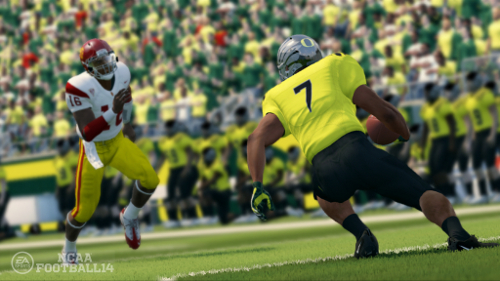Now The NCAA is Suing EA

Electronic Arts’ legal troubles relating to the alleged use of player likenesses in college football and basketball video games did not come to an end with the settlement in the Ed O’Bannon led lawsuit. The NCAA is now challenging the company, along with the CLC, regarding the $40 million settlement they reached in late September.
The crux of the matter is that the NCAA believes the two parties breached contractual obligations in not maintaining sufficient liability insurance, that EA should still have to cover any future judgments against the NCAA related to video games, that the CLC did not adequately supervise the production of the video games, and that the two should further be responsible for the NCAA’s related legal fees.
They also claim that EA expressly agreed not to include student athlete names and likenesses in the football and basketball video games – even though evidence in the case shows the NCAA worked with EA closely on the matter, were aware of how likenesses were being represented, and even were on the brink of allowing player names in the games. The NCAA seeks to have approval of the settlement that EA and the CLC reached with the plaintiffs blocked.
Earlier/Summary Below
The player likeness lawsuit against the NCAA, CLC, and Electronic Arts is the culmination of two high profile filings that were combined as led by Sam Keller and Ed O’Bannon (and O’Bannon now heads it up). It alleges improper use of player likeness through various forms of merchandise and media including video games in which the parties in question conspired to avoid paying players for their rights. Some interesting details and claims regarding the case at hand were revealed when EA was reentered as a defendant after initially being dismissed.
EA originally won a previous case regarding player likeness with the courts ruling video games are artistic works rather than commercial speech and therefore protected by the First Amendment. The Supreme Court in 2011 established forms of media, producing expressive works of art, are not subject to judgments based on incorporating someone’s name or likeness. That dismissed case however, involving Ryan Hart, has resurfaced after an appeals court reversed a decision based on that argument.
Recent uncovered emails have shown that NCAA representatives were well aware that players in games were based off real-life players. At one point the NCAA and EA had nearly reached an agreement to have actual player names included in the products. The EA Locker / Roster Share feature was a fallback option. With momentum clearly on the plantiffs’ side NCAA reps have begun to publicly express concern over the future of collegiate sports. A former EA Sports producer admitted players in NCAA games were based off real athletes.
The discovery of Tim Tebow’s name being in NCAA Football 10 could throw another wrench into EA’s series of arguments. Depositions from former Alabama wide receiver Tyrone Prothro and UConn basketball guard Tate George support the defendant’s reasoning for denying class action certification. The class action hearing resulted in the judge heavily questioning the legitimacy of a potential class and insisting a current athlete be involved. The judge required current athletes be added as plaintiffs for that party to have representation if the case is certified as class action. Six current college football players were added as plaintiffs in mid-July.
EA is now arguing to be dismissed as a defendant in the suit. A major defense for the company however was recently struck down by an appeals court.
This consolidated case in California if certified as class action would go to trial – barring a settlement – and ultimately be the determining factor of how the NCAA proceeds in the future handling broadcasting rights, merchandising, and video games. Should a negative result come down, which one analyst has pegged as being a potential loss of $1 billion for EA, it would likely not just end the NCAA Football series but also with it any realistic possibility of college sports games being made in the future. The trial now is slated to begin June 9, 2014. Appeals following a decision could extend the fight through 2020.
[RESOLUTION] EA and the CLC have settled the lawsuit. EA Sports will no longer produce a college football game. Getting out of the lawsuit only cost EA and CLC $40 million.
